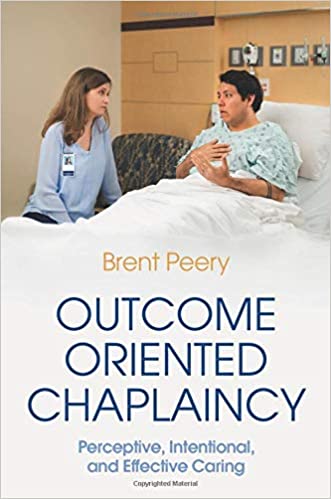by Brent Peery, London, Jessica Kingsley Publishers, 2021, 121 pp., £18.99 (PBK), ISBN 9781785926822
This is a well-researched, grounded, and passionate text that makes a persuasive case for Outcome Oriented Chaplaincy (OOC). This process embraces a methodology of care that articulates the difference that a chaplain can make to patients, their families and the health care institution. It models generative practical theology that manages to hold theory and practice together.
Written from an American perspective it has relevance for the UK and European context. Peery establishes his authority as a practioner of fifteen years. There is a helpful balance between experience and research.
The book offers a vision of care and caring which stand at the heart of the identity, role, and function of the chaplain (8). In this context Peery sets out a case of the importance of accurately perceiving the needs and resources of others (assessment), being intentional about the ways we try to help (interventions) and our desire to be effective at providing help (outcomes).
Chapter One (Chaplaincy – Making a Difference) considers the effectiveness of the intervention of a chaplain work (13). Chaplaincy’s professional foundations are described as: personal spiritual maturity; genuine caring relationships; self-awareness; an appropriate use of personal/pastoral authority; and active listening and non-directive helping. These qualities and skills undergird the life of the chaplain and their ministry.
Chapter Two defines OCC as ‘a method of chaplaincy care that emphasises achieving, describing, measuring, and improving the outcomes that result from a chaplain’s work’ (21). Its primary components include chaplaincy assessment, chaplaincy intervention, and chaplaincy outcomes. The influences on assessment are described, which include personal influences. There is an acknowledgement in the assessment process of the chaplain’s abilities alongside their character, temperament, and personality.
Chaplaincy works within a culture and this is shaped by several influences. They are described as the academic, an approach to delivery shaped by business, the law, and politics. It is into this that ministry must find a credible voice and place. In this chapter the dynamic between the personal and the professional might have been further explored especially in a society increasingly ambivalent about the usefulness of religion for health.
While there is an acknowledgement of some of the resistances to OCC the author argues that accountability in health care will be a central feature of its survival. The chaplain, he argues must be committed to accountability, to the best practice and to collaboration (32).
Chapter 3 tackles assessment with skill. This includes the complex question of how we define spirituality as ‘the aspect of humanity that refers to the way individuals seek and express meaning and purpose and the way they experience their connectedness to the moment, to self, to others, to nature, and to the significant or sacred.’ (39). There is an acknowledgement that both human experience and professional chaplaincy care are very complex and as such they are to some extent and by necessity reductionistic. The chaplaincy assessment never completely describes the cares recipients experience or the care of the chaplain. Chaplaincy assessment is a dynamic and complex process. Assessment models and assessment processes are discussed, and the chapter ends with some helpful potential assessment questions.
Chapter 4 of explores the nature of these interventions in ministry with definitions of empowerment (65), exploration (67), collaboration (68), relationship building (69), and ritual (70). This is picked up and developed in Chapter 5 as possible outcomes are explored. Chapter 6 addresses the subject of documentation which is built upon in Chapter 7 as it handles other components of outcome orientated chaplaincy which includes quality improvement research.
The book concludes with a drawing together of some of the key themes including the nature of relationships, hospitality, listening and storytelling, and helping and concluding. There is a comprehensive set of references together with a useful bibliography.
Peery is to be commended for an important contribution to the literature in this area. I hope that practitioners and practical theologians will further test some of this material out in several contexts. In a world dominated by functionalism, materialism, and disconnection, we are invited here into a relational and pastoral encounter where our stories are given voice and dignity. It is work that lies at the heart of human flourishing.
